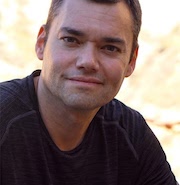Arab-Israeli conflict discussed at Grayson Kirk lecture, presented by Miami's Department of Global & Intercultural Studies


Peter Beinart
Written by Emma Boggess, CAS communications intern
“I do not believe in the moral legitimacy of a Jewish state that privileges Jews over Palestinians,” said journalist Peter Beinart, who spoke on October 5 as part of the Grayson Kirk Distinguished Lecture series.
Beinart is an author, journalist, and professor of political science and journalism at the City University of New York. His research focuses on the Arab-Israeli conflict. He is the author of three books, The Crisis of Zionism, The Icarus Syndrome, and The Good Fight: Why Liberals—and Only Liberals—Can Win the War on Terror. His views have also been published in the New York Times, the Atlantic, and the New Yorker.
The talk, held in Wilks Auditorium, was sponsored by the Department of Global and Intercultural Studies. The Grayson Kirk lectures provide a platform on Miami’s campus for experts and students to exchange thoughts and learn about different perspectives on such critical global issues.
The Arab-Israeli conflict is an issue that has circulated American foreign policy for decades and looks to continue as such for the foreseeable future. Beinart is an advocate of the one-state solution for Israel and Palestine.
The illuminating conversation on Tuesday evening was a question and answer format, moderated by Nathan French, professor of comparative religion, and Mark Peterson, professor of anthropology and global and intercultural studies. Attendees were invited to come up and pose their questions to Beinart.
The case for a one-state solution
Beinart started by sharing his own family’s history as part of the global Jewish diaspora, in which generations of Jewish people have spent the past two thousand years as refugees. He discussed how these experiences fuel the desire for a Jewish state.
Beinart then shifted to his personal point of view: that there should be one state where Palestinians and Israelis have equal political representation. He added that in the West Bank and Gaza Strip today, the lives of Palestinians are controlled by the Israeli state, but they are not considered citizens.
“This is an extreme deprivation of rights,” he said.
Beinart made a comparison between the experiences of Palestinians in Israel and the experiences of Black people in America. He explained how the lives of Palestinians in Israel are similar to the Jim Crow Laws for Black Americans in the 20th century.
“Similar to the Civil Rights movement in the 1950s and 1960s, it’s important to understand the rights of Palestinians in order to change public discourse on the conflict,” he said.
In terms of the current widespread interest in this issue, French posed the question, “what is it about this current moment?” In response, Beinart talked about the role of the media and young people.
“Palestinians have historically been excluded from the mainstream media,” he said. “The inclusion of Palestinians changes the conversation.”
The viability of a one-state solution and the consequences for Jewish people was a concern posed by one of the audience members. Under a one-state solution, there is a fear of Jewish people being expelled, since they are technically a population minority in the territory.
Beinart argued, however, that under a liberal democratic government, “societies with deep divides are more peaceful under a condition of political equality.” He explained how there is currently not much openness by Israel to this solution, but that this can quickly change with the power of social movements.
“Great movements for freedom can make things that seem impossible in one moment, possible in another,” said Beinart.
After the talk, Rhonda Krehbiel, a senior International Studies and Professional Writing major, said she always enjoys the Grayson Kirk lectures. “I like the Q&A format because it makes the discussion feel relevant to my community,” she said. “I learned about the Israel-Palestine conflict, but I also got to learn about my peers and their opinions and areas of research interest.”
The next Grayson Kirk lecture features Steve Coll, dean of the Columbia Journalism School and writer at the New Yorker. The subject of the talk is “Lessons of Defeat in Afghanistan” and takes place on November 1 at 6 pm in the Farmer School of Business.

